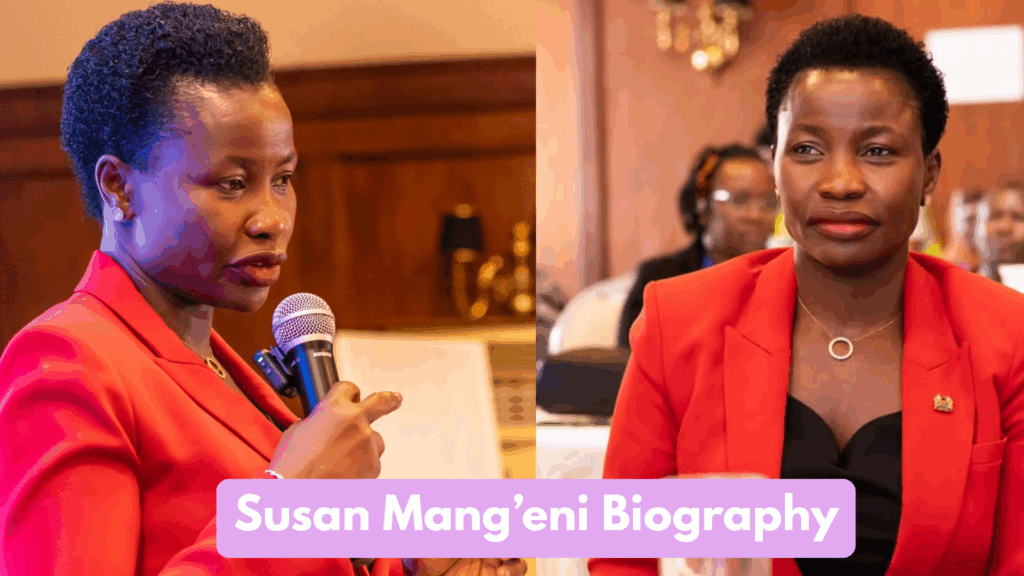Susan Mang’eni Biography: Education, Career, Age, Net Worth, Husband

Susan Auma Mang’eni is a prominent Kenyan governance and development professional who currently serves as the Principal Secretary of the State Department of Micro, Small and Medium Enterprises (MSMEs) Development under the Ministry of Cooperatives and MSMEs.
In her role, she brings nearly 15 years of experience in public policy, institution-building, youth and women empowerment, and enterprise development.
Early Life & Education
Although specific details about Susan Mang’eni’s early childhood and birthplace are not broadly documented in publicly available sources, her academic credentials are clearer. She holds a Bachelor’s degree in Political Science & Public Administration from the University of Nairobi, and a Master’s degree in Entrepreneurship Development. Additionally, she is an alumnus of the International Visitors Leadership Programme (IVLP) of the U.S. State Department, 2011 edition.
Career Beginnings & Rise
Susan Mang’eni’s career spans both private and public sectors, bringing together enterprise development, public policy formulation, and institutional oversight. According to official profiles, she has around 15 years of experience in strategic leadership, public policy formulation, analysis and implementation, enterprise development, institutional building, oversight, youth and women empowerment. Prior to her current appointment, she served on boards including the Youth Enterprise Development Fund (YEDF), the Kenya Institute of Public Policy Research and Analysis (KIPPRA), and the Competition Tribunal of Kenya. She was also a member of the Working Group on the Socio-Economic Audit of the Constitution of Kenya (2010) under the Office of the Auditor General, assessing the impact of the Constitution on governance and public institutions.
Appointment as Principal Secretary, MSME Development
In November 2022, Susan Mang’eni was appointed by President William Ruto as Principal Secretary in the Ministry of Cooperatives and MSMEs. She was sworn in on 1 December 2022 along with a slate of other PSs. In her capacity as PS for the State Department of MSME Development, she has been central to shaping the government’s agenda for small business growth, youth and women entrepreneurship, and institutional reform of the MSME ecosystem in Kenya.
For example, under her leadership: She’s emphasised the decriminalisation of informal work so that more entrepreneurs can operate with dignity. She has driven digital transformation, regulatory reform, and partnerships to ease access to finance and markets for MSMEs.
Major Achievements & Impact
Here are some of the key achievements and areas of impact worth noting:
- Strengthening the MSME Ecosystem: Susan Mang’eni has overseen efforts to simplify business registration, digitise public services, and reduce the regulatory burden for micro and small enterprises.
- Youth and Women Empowerment: Her work emphasises empowering traditionally underserved groups: young entrepreneurs and women-led enterprises. She has been noted to champion inclusive representation and targeted interventions.
- Institutional Governance & Oversight: Her prior roles in governance and public policy oversight (e.g., working group on the Constitution audit) help inform her approach to institutional reform and public-private partnerships.
- Strategic Partnerships: Under her stewardship, the MSME department has hosted important strategic engagements (e.g., with Equity Bank leadership) to mobilise finance, capacity building and market linkages for MSMEs.
Leadership Style & Vision
What stands out about Susan Mang’eni’s leadership:
- She frames the role of government as a facilitator not a competitor.
- She emphasises dignity for informal work and broader inclusion in the economy.
- She focuses on data-driven reforms and leveraging digital platforms to reduce friction in business operations.
- Her background suggests a hybrid capacity: public policy + enterprise development + institutional governance.
Her vision for Kenya’s MSME sector is one where small enterprises are formally recognised, financially included, and able to scale, thereby contributing more robustly to national growth.
Challenges & Opportunities
While Susan Mang’eni’s agenda is bold, the MSME sector in Kenya faces persistent challenges:
- Informal sector dominance – Many micro-enterprises operate without formal registration, making access to finance and markets difficult.
- Regulatory and bureaucratic hurdles – Even with reform efforts, friction remains for many small business operators.
- Access to affordable finance – Though progress is being made (e.g., via the Hustler Fund model), the gap remains large.
- Market access and value chain integration – Small enterprises often struggle to participate in formal supply chains.
However, opportunities include:
- Digital platforms and e-Citizen services to simplify business registration and compliance.
- Government-private partnerships to provide tailored financial products and capacity building.
- Strategic policy reforms to empower youth and women entrepreneurs.
- Regional and value-chain opportunities to scale micro businesses into larger enterprises.
Under her leadership, Mang’eni appears to be addressing many of these issues strategically.
Personal Qualities & Affiliations
Beyond her formal roles, some personal and professional affiliations help round out her profile:
- She is a network member of the Mandela Institute for Development Studies (MINDS), the Women Democracy Network (WDN), and the Women Waging Peace International, and the Pan African Movement.
- Her cross-sector experience (private & public) gives her a broad stakeholder base: from grassroots enterprise actors to high-level policy makers.
- She has been active in public discourse around economic transformation, youth inclusion and the role of MSMEs in national development.
Future Outlook
Looking ahead, Susan Mang’eni’s role will likely become even more critical as Kenya pushes to recover economically post-pandemic, accelerate youth employment, and integrate more small enterprises into formal value chains.
Key focus areas may include:
- Scaling the use of digital finance and credit-scoring models for informal business owners.
- Enhancing partnerships between government, banks, and fintechs for MSME support.
- Deepening market linkages for micro and small enterprises in sectors such as dairy, textiles, coffee, edible oils and leather.
- Strengthening regulatory reforms to ease formalisation of small enterprises and reduce burdens.
- Ensuring inclusive growth for youth and women entrepreneurs across Kenya’s regions.
If these ambitions are realised, the MSME landscape in Kenya could undergo significant transformation—and Susan Mang’eni is positioned as a leading figure in that transformation.
FAQs
Q1: Who is Susan Mang’eni?
Susan Mang’eni is a Kenyan governance and development expert currently serving as the Principal Secretary of the State Department of Micro, Small and Medium Enterprises (MSME) Development under the Ministry of Cooperatives and MSMEs.
Q2: What are her academic credentials?
She holds a Bachelor’s degree in Political Science & Public Administration and a Master’s degree in Entrepreneurship Development from the University of Nairobi. She is also an alumnus of the U.S. State Department’s International Visitors Leadership Programme (IVLP) from 2011.
Q3: When was she appointed Principal Secretary for MSME Development?
She was appointed in November 2022 and sworn in on 1 December 2022.
Q4: What are the key focus areas of her role?
Her focus areas include strategic leadership in enterprise development, institutional building, oversight, youth and women empowerment, digitisation of services, regulatory reform, access to finance for MSMEs, and formalisation of informal enterprises.
Q5: What previous experience does she have?
Prior to her current PS appointment, she served on boards such as YEDF, KIPPRA, and the Competition Tribunal of Kenya, and was part of the working group for the socio-economic audit of the Constitution of Kenya 2010.
Q6: What major initiatives has she led?
She has championed efforts such as the decriminalisation of informal work, simplification of business processes, digital registration platforms, strengthened partnerships with banks (e.g., Equity Bank) for MSME finance, and targeted youth and women-led enterprise programmes.
Conclusion
Susan Mang’eni is a distinguished and dynamic figure in Kenya’s governance and enterprise ecosystem. Her academic background, combined with cross-sector experience and a clear commitment to youth, women, and small business empowerment, make her a key player in Kenya’s economic transformation.
In her role as Principal Secretary for MSME Development she is working to lift barriers, simplify processes, and build inclusive economic structures that allow micro and small enterprises to thrive. Her vision — of an ecosystem where informal entrepreneurs gain dignity, access to finance, markets and visibility — is both ambitious and highly relevant in Kenya’s context.
For anyone interested in enterprise development, public policy, youth empowerment or women’s economic inclusion in Africa, Susan Mang’eni’s biography offers valuable insights about leadership, reform, and the power of strategic partnerships. She remains a figure to watch in the effort to build resilient, inclusive economies.


